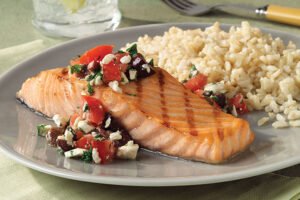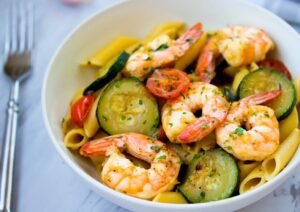
Mediterranean Diet Based Breakfast, Lunch, and Dinner Ideas for Weight Loss

The Mediterranean diet is often regarded as one of the healthiest diets on the planet. It has been associated with a range of health benefits, including weight loss, because of its emphasis on fresh, whole foods, lean protein, and healthy fats.
Table of Contents
Introduction
The Mediterranean Diet is a wonderful example of how food can be both enjoyable and healthy. Its enduring appeal stems from its emphasis on fresh, natural foods and the value of sharing meals with loved ones. It comprises several feasible ideas for breakfast, lunch, and dinner for weight loss. As research continues to unearth the numerous benefits of this dietary plan, it is obvious that the Mediterranean Diet is more than a passing fad but a sustainable and joyful way of life that promotes long-term health and well-being. We can embark on a lifetime path toward greater health by adopting its ideals and incorporating them into our daily lives through breakfast, lunch, and dinner for weight loss. This article will explore Mediterranean-inspired breakfast, lunch, and dinner recipes for weight loss.

What is the Mediterranean Diet?

The Mediterranean Diet is a timeless pattern for health and well-being in a world fascinated with fad diets. Nutritionists, researchers, and health-conscious people all over the world are interested in this dietary pattern, which draws inspiration from the traditional eating habits of people who live in the Mediterranean region. Its appeal goes beyond weight loss because it promotes not just physical health but also mental and emotional well-being. The Mediterranean Diet is more than simply a diet; it’s a way of life, with rich ideas for breakfast, lunch, and dinner for weight loss, a history extending back centuries, and a growing number of scientific studies supporting its advantages.
Origin of Mediterranean Diet
The Mediterranean Diet is not a new concept; rather, it is a reflection of the dietary patterns that have maintained people in the Mediterranean region for decades. Its origins can be traced back to the early 1960s, when researchers first noticed the extremely low cases of cardiovascular illness among Mediterranean populations, particularly in Greece and southern Italy. This resulted in Ancel Keys’ famous Seven Countries Study, which laid the groundwork for current understanding of the Mediterranean Diet.
Major Components of Mediterranean Diet
A diverse and well-balanced approach to eating is what sets the Mediterranean Diet apart. It stresses natural, unprocessed foods and promotes moderation in all aspects of life. It comprises fantastic ideas regarding breakfast, lunch, and dinner for weight loss. The following are the diet’s main features:

Abundance of Fruits and Vegetables: Fruits and vegetables provide a large share of daily calories. These provide important vitamins, minerals, and antioxidants while limiting calorie consumption.

Healthy Fats: Olive oil is an essential component of the Mediterranean Diet. It is used in cooking, salad dressing, and as a condiment. Olive oil, which is high in monounsaturated fats and antioxidants, is recognized to offer several health benefits, notably for heart health.

Lean Protein: The diet contains moderate amounts of fish, poultry, and dairy products, with a preference for omega-3-rich seafood such as salmon, sardines, and mackerel. Protein-rich legumes and nuts are also available.

Whole Grains: Whole grains such as whole wheat, oats, and brown rice are Mediterranean Diet essentials. They are high in fiber and provide long-lasting energy.

Herbs and Spices: Fresh herbs like basil, oregano, and thyme, as well as spices like garlic and onions, are freely used to add flavor and lessen the need for salt. Even the easy Mediterranean lunch ideas become delicious due to their usage.

Moderate Consumption of Red Wine: While alcohol is not necessary, moderate consumption of red wine (usually with meals) is a popular habit in Mediterranean cultures and is regarded as contributing to the diet’s health advantages.

Limit Red Meat: The Mediterranean Diet limits red meat consumption. It is frequently consumed in smaller portions and as part of recipes like stews and casseroles.
Social and Lifestyle Factors: The Mediterranean Diet emphasizes the value of social ties, regular physical activity, and mindful eating practices in addition to food. Meals are frequently shared with family and friends, fostering a joyful and relaxing dining experience.
Mediterranean Diet’s Health Advantages

The Mediterranean Diet has been widely researched, and the evidence consistently points to its multiple health benefits:
Heart Health: The diet’s potential to lower the risk of heart disease is perhaps its most well-known advantage. Consuming a lot of monounsaturated fats from olive oil, omega-3 fatty acids from fish, and antioxidants from fruits and vegetables all help your heart.
Better Weight Management: Because of its emphasis on full, nutrient-dense foods and portion control, the Mediterranean Diet is associated with healthy weight management.
Lower Risk of Chronic Diseases: Research has indicated that following the Mediterranean Diet can lower the risk of a variety of chronic diseases, including type 2 diabetes, some cancers, and neurological diseases such as Alzheimer’s.
Improved Mental Health: Research suggests that food can improve mental health by lowering the risk of depression and cognitive decline.
Longevity: Mediterranean populations have some of the longest life expectancies in the world, and the diet is thought to contribute to their longevity.
Inflammation Reduction: The anti-inflammatory qualities of the diet may help reduce the risk of chronic inflammation, which plays a role in many diseases.
Putting the Mediterranean Diet into Practice

The Mediterranean Diet can be a gratifying path toward better health and well-being. Here are some practical suggestions for applying its concepts in your daily life:
Begin with Small Changes: Rather than attempting a major overhaul, gradually incorporate Mediterranean-style meals into your diet. Begin with one or two meals per week and work your way up. Seek and follow easy Mediterranean lunch ideas to begin, then proceed further.
Use Olive Oil: For sautéing, roasting, and salad dressings, replace other cooking oils with extra virgin olive oil.
Consume More Plant Based Foods: Increase your consumption of fruits, vegetables, legumes, and whole grains. To make these dishes more appetizing, try out different recipes. Start with easy Mediterranean lunch ideas and you may experiment further for distinct flavor.
Choose Lean Proteins: Instead of red meat, choose fish and poultry, and add plant-based proteins like beans and nuts to your meals.
Limit Processed Foods: Cut back on processed and quick foods, which are heavy in unhealthy fats, carbohydrates, and salt.
Mindfully Enjoy Meals: Savor your meals and practice mindful eating by focusing on the flavors and textures of your food. Eating with family or friends can improve the overall experience.
Stay Active: Include regular physical activity in your routine to supplement the health benefits of your diet.
Stay Hydrated: Drink plenty of water throughout the day and limit your intake of sugary beverages.
Drink Moderately: If you choose to drink alcohol, do so in moderation and preferably with meals.
Seek Professional Advice: Before making large dietary changes, consult with a healthcare physician or qualified dietitian, especially if you have specific health issues or dietary limitations.
Weight Loss Breakfast, Lunch, and Dinner Ideas from the Mediterranean
- Breakfast Ideas
Some of the most prominent breakfast ideas from the Mediterranean are mentioned below:
- Fruit and Nut Greek Yogurt

Greek yogurt is high in protein, which can help you feel full and satisfied until lunchtime. For some healthy fats and crunch, add some fresh fruit, such as berries or sliced banana, and a handful of nuts, such as almonds or walnuts.
- Omelet Mediterranean

Combine eggs, spinach, tomatoes, and feta cheese in a mixing bowl. Cook in a non-stick pan until set and serve with a side of whole-grain toast.
- Avocado Toast with Egg

Toast a slice of whole-grain bread and top with mashed avocado and a poached or cooked egg. Sprinkle it with a little salt and pepper and enjoy.
Note: There might be affiliate links mentioned here. We may receive a commission if you purchase a product through an affiliate link. There is no additional charge for you. Please do your own research before making any online purchases.
- Oatmeal with Nuts and Fruit

Cook oats with water or milk and add chopped nuts, such as almonds or walnuts, and fresh fruit, such as apples or berries. Sprinkle it with a little cinnamon for added taste.
- Mediterranean Frittata

Whisk together eggs with diced cherry tomatoes, spinach, and feta cheese. Cook in a non-stick pan until set and serve with a side of fresh fruit or whole-grain bread.
- Berries Chia Seed Pudding

Chia seeds, milk, and a sweetener, such as honey or maple syrup, should be combined and refrigerated overnight. In the morning, top with fresh berries.
- Lunch Ideas
Some of the most delicious Mediterranean diet lunch recipes are mentioned below:
- Salad with Greek Dressing

Toss in some fresh greens, cherry tomatoes, cucumber slices, red onion, olives, and feta cheese. Dress with olive oil, lemon juice, and dried oregano vinaigrette.
- Skewers of Grilled Chicken and Vegetables

Thread skewers with chicken chunks and your favorite vegetables, such as zucchini, bell peppers, and onions. Grill the chicken until it is fully done and the veggies are browned.
- Wrapped in a Mediterranean Style
Combine hummus, grilled chicken, sliced cucumber, red onion, and roasted red peppers in a whole-grain wrap. Roll up your sleeves and enjoy one of the tastiest Mediterranean diet lunch recipes.
- Salad with Tuna in Greek Style

Combine canned tuna, cucumber, cherry tomatoes, red onion, and kalamata olives. Dress with olive oil, lemon juice, and oregano vinaigrette.
- Falafel Salad

Cooked quinoa should be topped with homemade or store-bought falafel, sliced tomatoes, cucumber, and hummus. Dress with tahini dressing.
- Salad with Grilled Eggplant and Halloumi

Grill eggplant and halloumi cheese slices and serve on a bed of mixed greens. Dress with a light lemon-olive-oil dressing and enjoy one of the best Mediterranean diet lunch recipes with your loved ones.
- Dinner Ideas
Some of the most sought after Mediterranean dinner ideas are as follows:
- Salmon grilled with a Mediterranean salsa

Salt, pepper, and dried oregano season a fish fillet. Grill until done, and serve with a salsa of diced tomatoes, cucumber, red onion, and olive oil drizzle.
- Pasta with Shrimp and Zucchini

Sauté shrimp and zucchini slices in olive oil until cooked through. Toss with cooked whole-grain pasta and a simple sauce of garlic, lemon juice, and olive oil. Wait for a moment and be ready to enjoy one of the most delicious Mediterranean dinner ideas with your loved ones.
- Stuffed Greek Peppers

Remove the tops of bell peppers and remove the seeds and membranes before stuffing with ground turkey, quinoa, chopped spinach, and feta cheese. Bake until the peppers are soft and the filling is thoroughly cooked.
- Stuffed Chicken Breast in Greek Style

Make a pocket in the chicken breasts and stuff with a spinach, feta cheese, and sun-dried tomato mixture. Bake until the chicken is cooked through, then serve with roasted veggies on the side.
- Stew with Lentils and Vegetables

In olive oil, soften onions, carrots, celery, and garlic. Cook until the lentils are soft, then add the tinned tomatoes, vegetable broth, and lentils. Serve with crispy whole-grain bread on the side.
- Skewers of Grilled Shrimp with Quinoa Tabbouleh

Grill marinated shrimp on skewers until cooked through. Serve with quinoa tabbouleh made with chopped parsley, tomatoes, cucumber, and lemon juice as a side dish.
FAQs
What exactly is the Mediterranean Diet, and why is it said to be healthy?
The typical eating habits of people who live in the Mediterranean region served as inspiration for the Mediterranean Diet. It is seen as healthful because it stresses complete, unprocessed foods, healthy fats such as olive oil, lean protein, and a variety of fruits and vegetables. This healthy eating plan has been linked to several health advantages.
How did the Mediterranean Diet come about?
The Mediterranean Diet has its origins in the 1960s, when studies discovered that Mediterranean inhabitants had low rates of heart disease. Ancel Keys’ landmark Seven Countries Study established our awareness of this food pattern.
What are the essential elements of the Mediterranean Diet?
The Mediterranean Diet stresses social and lifestyle variables such as mindful eating and physical activity, as well as an abundance of fruits and vegetables, healthy fats such as olive oil, lean protein sources, whole grains, herbs, and spices, moderate red wine drinking, and restricted red meat consumption.
What are the health benefits of the Mediterranean Diet?
The Mediterranean Diet has been associated with better heart health, weight control, a lower risk of chronic diseases (such as diabetes and certain malignancies), improved mental health, greater longevity, and reduced inflammation.
How can I incorporate the Mediterranean Diet into my regular routine?
Begin with minor modifications, such as eating more fruits and vegetables, cooking with olive oil, and choosing lean protein sources. Introduce Mediterranean-style meals into your daily routine gradually, and enjoy dinners with family and friends.
Can you share some Mediterranean-inspired breakfast ideas for losing weight?
Certainly! Greek yogurt with fruit and nuts, a Mediterranean omelet with spinach and feta, avocado toast with egg, porridge with nuts and fruit, a Mediterranean frittata with cherry tomatoes and feta, and chia seed pudding with berries are just a few possibilities.
What are some of the best Mediterranean diet lunch recipes?
Some of the easy Mediterranean lunch ideas include grilled chicken and veggie skewers, Mediterranean wraps with hummus and chicken, Greek-style tuna salad, falafel bowls with quinoa, and grilled eggplant and halloumi cheese salad.
Could you please recommend any Mediterranean-inspired supper recipes?
Certainly! Grilled salmon with Mediterranean salsa, shrimp and zucchini pasta with garlic and lemon, Greek stuffed peppers with ground turkey and quinoa, stuffed chicken breast with spinach and feta, lentil and vegetable stew with crusty bread, and grilled shrimp skewers with quinoa tabbouleh are just a few of the dishes to try.
Is it essential to drink red wine as part of the Mediterranean Diet?
No, it is not required. While moderate red wine intake is common in Mediterranean cultures and is thought to have certain health advantages, it is not mandatory. You can still follow the diet’s other guidelines if you don’t drink alcohol.
Should I visit a doctor before beginning the Mediterranean Diet?
Before making large dietary changes, it’s a good idea to consult with a healthcare physician or certified dietitian, especially if you have specific health issues or dietary limitations. They can provide you tailored advice and make sure your diet is right for you.
Conclusion
A Mediterranean-inspired diet can help you lose weight while simultaneously enjoying tasty, flavorful meals. You can feel pleased and nourished while losing weight by focusing on fresh, complete meals and including lots of healthy fats and lean protein. Try implementing some of these breakfast, lunch, and supper ideas into your meal planning and see how they might help you lose weight.
Disclaimer: The information provided in this article is for educational purposes only and should not be considered as a substitute for medical advice. Consult a healthcare professional before implementing any home remedies or making significant changes to your lifestyle.






